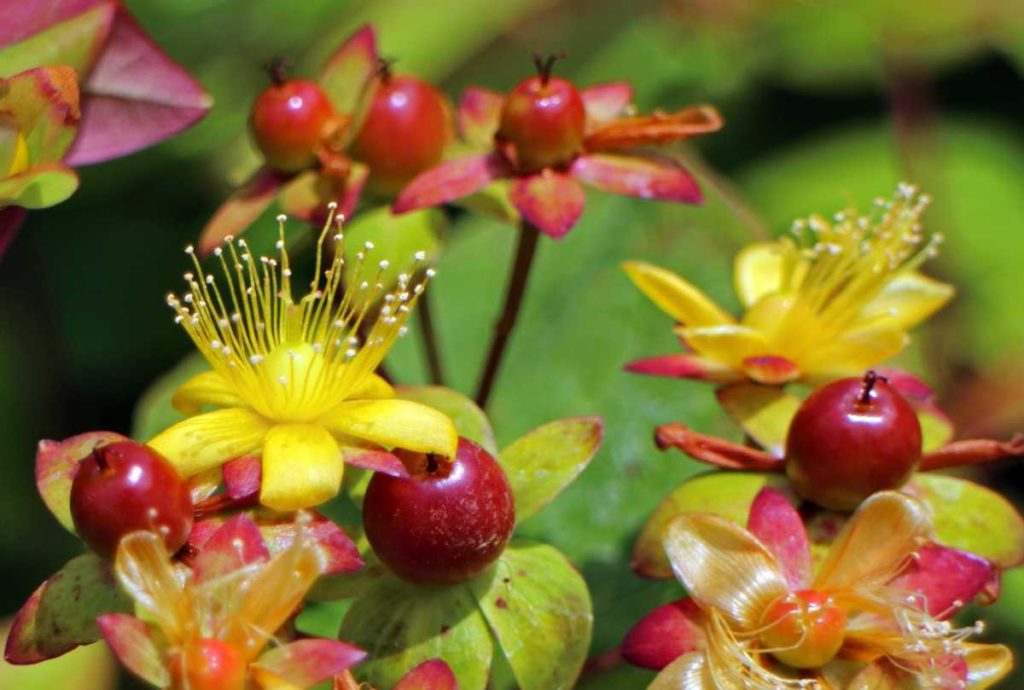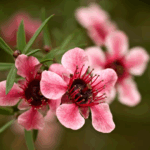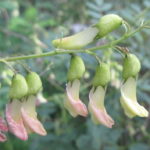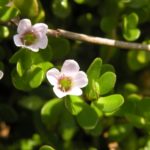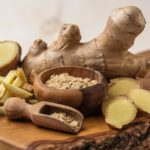
Marijana Jovanovic
(MEnvSci, BNatHerbMed, DipNut)
Used in Ancient Greece for wound healing and as a pain reliever, St John’s wort is today one of the most studied herbs in modern medicine.
Current research shows that St John’s wort has a positive effect on:
- depression
- anxiety
- chronic pain
and is also a potent antioxidant and anti-inflammatory.
However, it needs to be used in certain therapeutic dosages to achieve effectiveness and minimise any side-effects.
Introduction
St John’s wort is the most studied and most prescribed medicinal herb for nervous tension, inner frustration, and treatment of mild to moderate depression.
St John’s wort comes from the Clusiaceae family.[1] Medicinal properties of St John’s wort have been used since ancient Greece as part of traditional Greek medicine.[2]
Other names
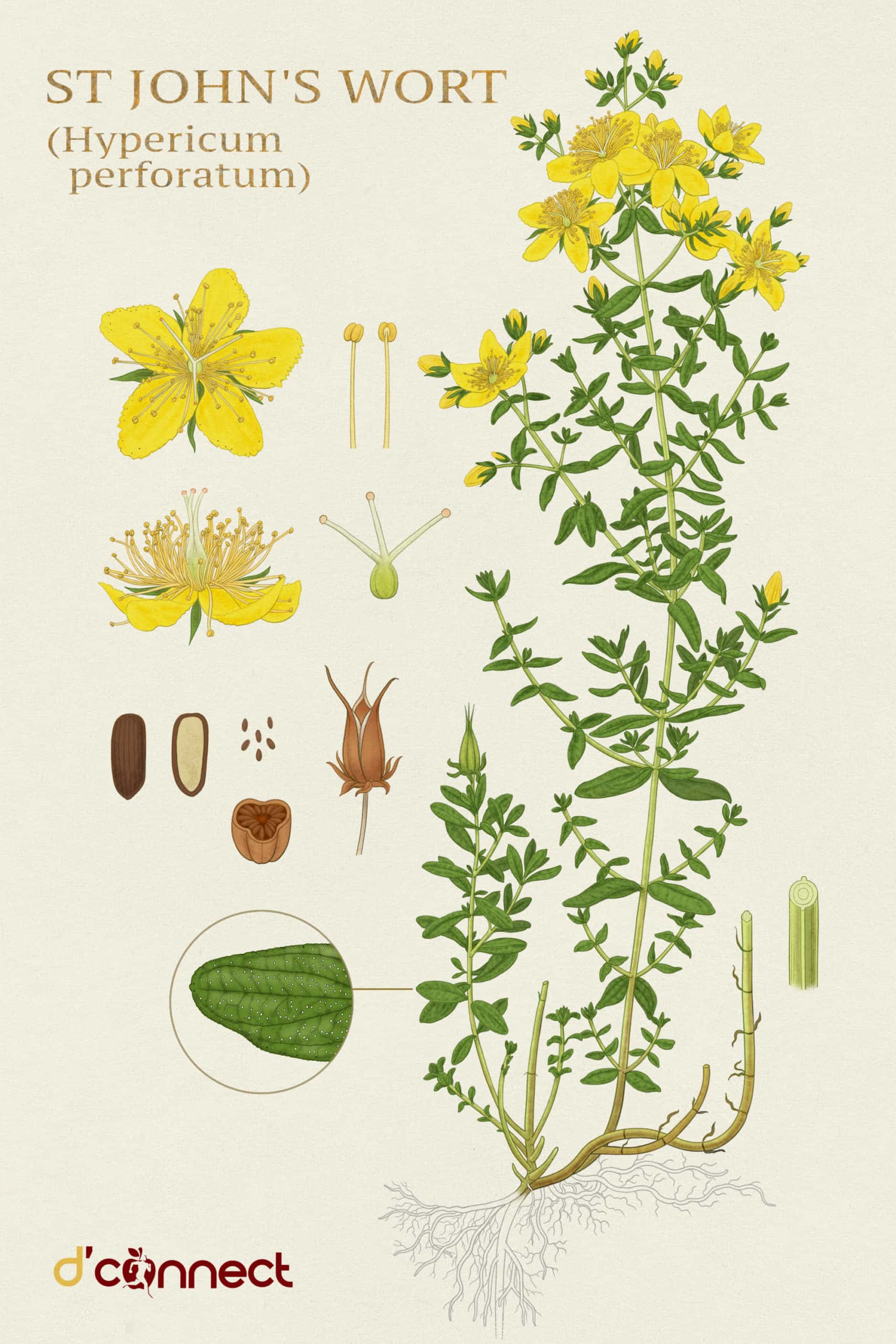
Botanical name: Hypericum perforatum
Common names: Hypericum, Amber, Touch-and-heal, Demon chaser, Tipton Weed, Witches’ herb.
English: Rosin rose, Witches’ herb, St John’s grass, Terrestrial sun, Goatweed, Klamath weed, Tipton weed.
French: Millepertuis, Herbe de St-Jean, Chasse-diable, Herbe aux piqures.
German: Johannuskraut, Tüpfelhartheu, Waldhopff, Wundkraut, Blutkraut, Tausendlöcherkraut, Liebfrauenbettstroh, Frauenkraut, Konradskraut, Donnerkraut, Teufelsflucht, Hexenkraut.[1,2,3,4]
Characteristics
St John’s wort is perennial herb that grows up to one metre high and flowers from mid-summer to autumn.[1] It is native to Europe, North Africa, North America, and Western Asia.[5]
St John’s wort prefers sunny open spaces but can grow in any weather conditions except very dry. It is aromatic and tastes bitter and acrid.[5]
St John’s wort has small oval or elliptical dark green leaves and corolla (8-20 mm diameter) with several golden yellow petals.[6]
The underside of the flowers have a slight red colour and many black glands that are a source of the main constituent hypericin.[1] Seeds are 0.8-1.3 mm long, cylindrical, brown.[6]
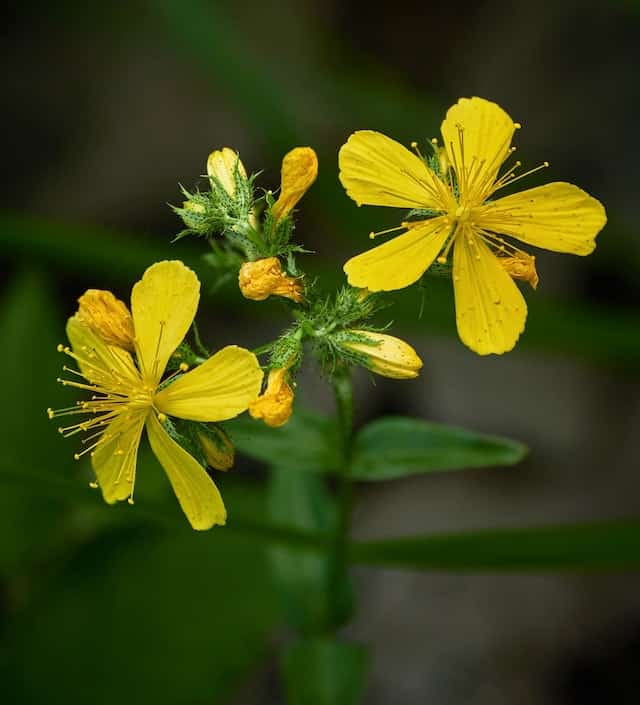
Source: Zhara @ Pexels
Five of many active constituents responsible for St John’s wort’s actions include:
- Naphtodianthrones (hypericin)
- Phloroglucinols (hyperforin)
- Flavonoids (rutin, quercetin)
- Volatile oil
- Tannins
Historically, research have shown that the main active constituents responsible for the management of nervous system disorders were hypericin and pseudo hypericin.[7]
Other St John’s wort constituents that have a potentially antidepressant action include hyperforin, rutin, and quercetin.[8]
Use
For centuries the aerial parts of the plant have been used during flowering as herbal medicine for external and internal ailments.
Traditional Use
St John’s wort has a long history of use starting in ancient Greece where it was recommended by physicians like Galen and Hippocrates for:
- wound healing
- diuretic properties
- menstrual disorders
- intestinal worms[5]
Throughout history St John’s wort was applied by many healers for its magical and ritualistic uses.[3] People from ancient Greece to the Middle Ages believed that St John’s wort has magical power against evil spirits.
In the 16th century, herbalist Paracelus and Culpeper were using St John’s wort to treat wounds, reduce pain, depression, low mood and over excitation.[3]
In the 18th and 19th century in Europe, teas and tinctures of St John’s wort were used for treatment of gastritis, anxiety and depression.[1]
Medicinal Use
St John’s wort is used for the nervous system, specifically for treating depression (uplifting), anxiety (grounding), neurosis and chronic nervous exhaustion, sciatica, neuralgia.[3]
St John’s wort is also used for the musculoskeletal system as a relaxant.
St John’s wort relieves chronic pain
Chronic pain in conditions like fibromyalgia, shingles, sciatica, rheumatoid arthritis, and period cramps is alleviated with the use of St John’s wort.[1]
Externally, St John’s wort is used for wounds, burns, ulcers.[9]
St John’s wort was approved by the German commission E as a main internal treatment for mild to moderate depression, anxiety and nervous restlessness in Germany and Austria in 1998.[1,9]
As topical treatment, St John’s wort oil was also approved by German Commission E for treatment of injuries, myalgia, and first-degree burns.
Nutritional facts
St John’s wort dried flowers and leaves are used to make tea. Flowers and leaves can be used as edible garnish in salads.
St John’s wort contains high amounts of:
- potassium
- phosphorus
- iron
- magnesium
- calcium
- sodium
- vitamin C
and trace amounts of:
- manganese
- zinc
- copper
- vitamin E
- B complex
- vitamin D[10]
RELATED — Vitamin D: The sunshine hormone for stronger bones
It also contains antioxidants iso-quercitrin, quercitrin, phenolic acid and chlorogenic acid that helps insulin regulation.[10]
Health benefits
St John’s wort has been used for many health conditions with a large body of research and clinical evidence supporting its use in the treatment of depression.
St John’s wort and depression
St John’s wort is mostly known as a natural alternative for pharmaceutical antidepressants.
Considering that antidepressant medications have a range of side effects, holistic practitioners and some orthodox medical practitioners recommend St John’s wort for depression management.
The conclusion of many studies demonstrated that re-uptake of neurotransmitters dopamine, serotonin, nor-adrenalin, and GABA are responsible for St John’s wort antidepressant action.[11,12]
St John’s wort inhibits serotonin reuptake not in the same way as SSRI antidepressant medications via serotonin transporter, but by increasing intracellular sodium concentration.[13,14]
Cochrane meta-analysis demonstrated that St John’s wort was better than placebo and has the same effectiveness as standard antidepressant medications.[15,16]
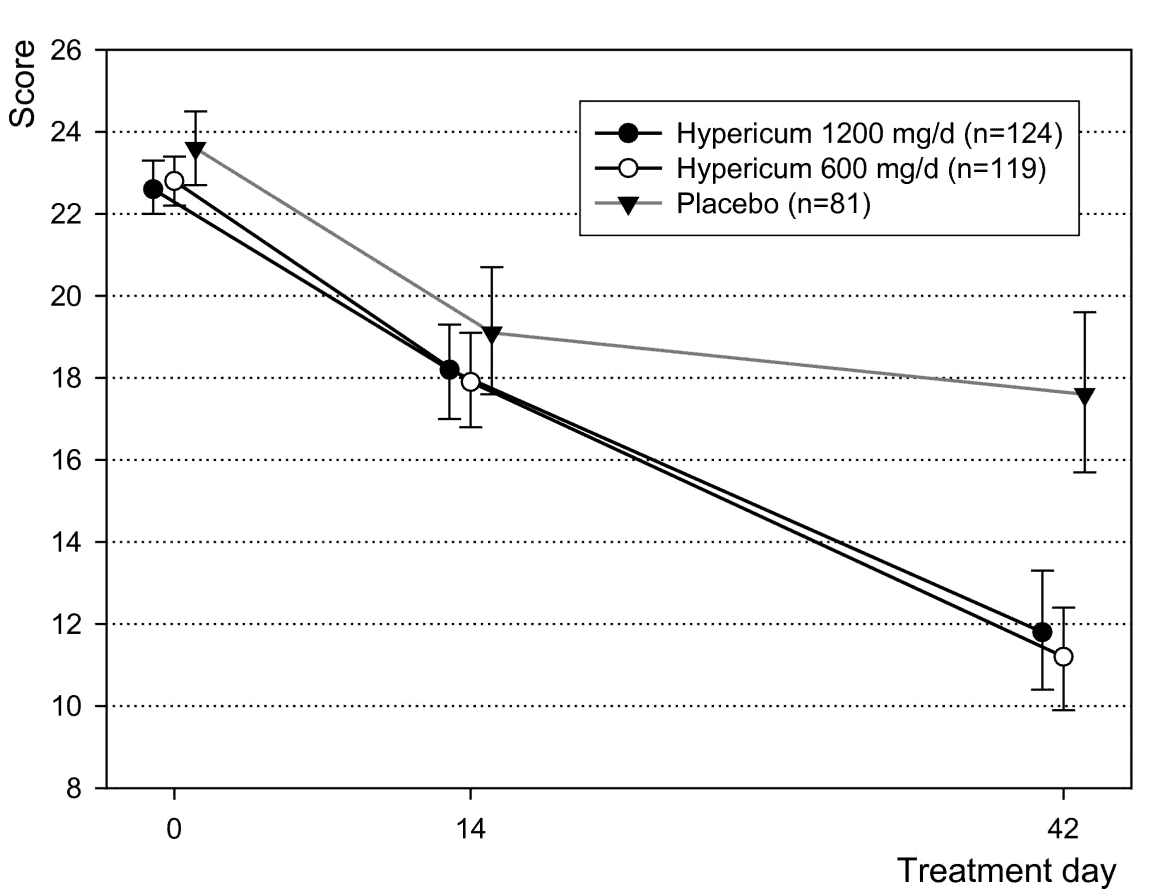
Source: Kasper, S., et al. Superior efficacy of St John's wort extract WS®5570 compared to placebo in patients with major depression: a randomized, double-blind, placebo-controlled, multi-center trial. (2006)
Thirty-seven double-blind, randomised studies including 4925 participants, using mono preparations of St John’s wort over at least 4 weeks improved symptoms of mild to moderate depression and had the same effects as synthetic antidepressants in adults.[17]
A randomised double blind, double dummy (use of two different placebos) study was undertaken on 251 adult patients with major depression to compare the efficiency of St John’s wort extract WS 5570 with paroxetine — SSRI antidepressant medication.[18]
The outcome demonstrated that for treatment of moderate to severe depression St John’s wort extract is better tolerated and at least as effective as paroxetine.[18]
Linde et al. (2018) concluded that St John’s wort extracts are:
- superior to placebo in patients with major depression
- similarly effective as standard antidepressants
- with fewer side effects than standard antidepressants
For treatment of severe depression St John’s wort extract was in some cases not as effective as pharmaceutical antidepressants.[17,18,19,20,21]
Therefore, recommendation in severe depression cases is not to rely only on St John’s wort treatment.
St John’s wort and anxiety
St John’s wort has been used clinically for treatment of anxiety, but there are not many studies conducted on efficiency for:
Treatment for OCD with a fixed dose of 450 mg of St John’s wort containing 0.3% hypericin twice daily over twelve weeks improved the condition in five of twelve patients.[24]
In a randomised study with sixty participants with OCD, St John’s wort was compared with placebo and results showed not much difference between placebo and St John’s wort.[22]
St John’s wort can help with anxiety
St John’s wort and external treatment
The combination of anti-inflammatory, analgesic and tissue-repairing actions of St John’s wort mean it is known as the best vulnerary for:
- treating burns
- haemorrhoids
- ulcers
- wounds[2,3,27]
As an analgesic, St John’s wort topically relieves pain from nerve injury or neuritis, and muscle pain.[2]
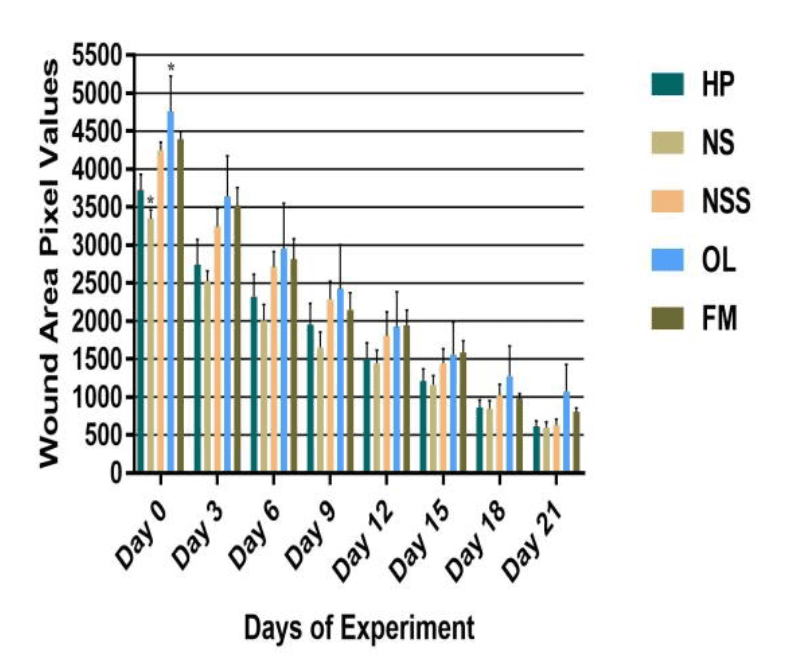
Source: Akin, I., et al. The Effect of Hypericum perforatum (St. John’s Wort) and Nigella sativa (Black Cumin) Oils on Wound Healing in Type-1 Diabetic Mice. (2022)
A cream containing St John’s wort extract was superior to placebo for moderate atopic dermatitis and reduced the intensity of eczematous lesions when used twice daily.[3,28]
St John’s wort as an antioxidant
Some constituents show strong antioxidant activity, including against oxidation from UV radiation.[1] St John’s wort extract prevents neurotoxicity, inflammation and gastrointestinal issues by decreasing oxidative stress.[3]
St John’s wort as an anti-inflammatory
St John’s wort demonstrated effects on inflammation and pain pathways in one study.[4] These anti-inflammatory properties are based on inhibitory effects of St John’s wort on pro-inflammatory genes including cyclooxygenase-2 (COX-2), interleukin-6 and nitric-oxide synthase (iNOS).[29]
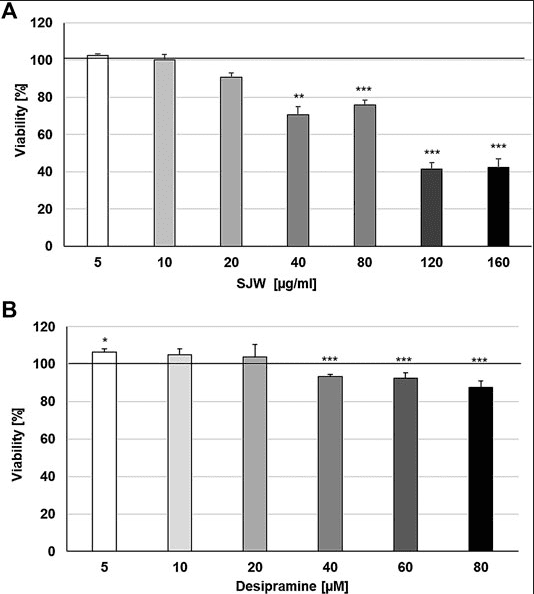
Source: Bonaterra, G., et al. In Vitro Effects of St. John’s Wort Extract Against Inflammatory and Oxidative Stress and in the Phagocytic and Migratory Activity of Mouse SIM-A9 Microglia. (2020)
Constituents like quercetin and flavonoids also contribute to the anti-inflammatory effect of St John’s wort.[4]
St John’s wort as an antimicrobial
Hypericum and pseudohypericin demonstrated antiviral activities against
- hepatitis B
- herpes simplex virus
- human cytomegalovirus
- influenza virus
- parainfluenza virus type 3
- vesicular stomatitis
- HSV1 and HSV2[1,4]
Hyperforin from St John’s wort extract has broad range antibacterial activity against many gram-positive and gram-negative bacteria.[30,31]
St John’s wort and cancer
St John’s wort has shown to effectively inhibit high and low-grade bladder cancer, prostate cancer, and leukaemia cells.[1]
St John’s wort and its constituents have potential photodynamic effects, acting as photosensitiser that can induce apoptosis and necrosis in cancer cells when combined with light irradiation.[32]
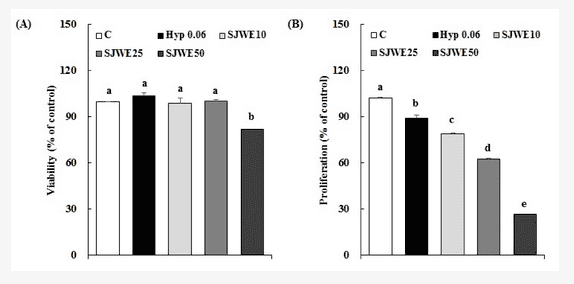
You, M.-K.; Kim, et al. St. John’s Wort Regulates Proliferation and Apoptosis in MCF-7 Human Breast Cancer Cells by Inhibiting AMPK/mTOR and Activating the Mitochondrial Pathway. (2018)
More controlled in vivo studies are required before St John’s wort is used in clinical practice for treatment of cancer.
Therapeutic dosage
St John’s wort can be used in:
- juice
- infusion
- tincture
- ointment
- compresses
- wash
- infused oils
The safe dosage include
- Infusion of dried herb: 2-4 g, three times a day
- Fluid extract (25%): 2-4 ml, three times a day
- Tincture (1:10, 45%): 2-4 ml, three times a day[1,2,4,9]
The clinical trials on depression were based on standardised extract with daily 300-1200 mg. The majority used 900 mg daily.
St John’s wort oil is made by steeping the flower heads in vegetable oil and exposing them to sunlight for 6 weeks.
Safety concerns
St John’s wort has very low toxicity.[4] St John’s wort’s side effects are minor compared to side effects of antidepressant medications.
St John’s wort potential side effects may include
- gastrointestinal symptoms (dyspepsia, diarrhoea, nausea, vomiting, constipation)
- skin conditions (rash, itch, sensitivity to light)
- fatigue
- restlessness
- acute neuropathy
- sexual dysfunction
- dizziness[1,33]
St John’s wort oil is safe for topical use
St John’s wort has the potential to interact with other medications.[1] Minor side effects are estimated to occur in 1-3% of users.
The phototoxic rash associated with St John’s wort which causes erythema, itch and heightened sensory nerve sensation has been well documented and is referred to as “hypericism”.[1,4]
It is recommended to avoid strong sunlight and UV light when using St John’s wort.
However, it was demonstrated that photosensitivity can occur in some patients who take high doses of St John’s wort (900mg or more once per day).[9,34]
A therapeutic dose of 2.7 mg/day of St John’s wort is about 50 times lower than the level that might induce phototoxicity.[9,35]
Possible interactions with medications
Reports of interactions exist for St John’s wort and the following pharmaceutical medications:
- Psychoactive drugs: amitriptyline, quazepam, methadone, alprazolam
- SSRI (sertraline, paroxetine, nefazodone) possibly leading to serotonin syndrome (increased levels of serotonin)
- Benzodiazepines (Xanax and alprazolam) – increasing its clearance by two-fold
- Contraceptive pills (St John’s wort can decrease norethindrone and ethinyl estradiol levels by 13% to 15%, resulting in breakthrough bleeding, irregular menstrual bleeding, or unplanned pregnancy)
- Antifungal (voriconazole)
- Cancer medications: imatinib and irinotecan
- Cardiovascular medications: digoxin, warfarin, phenprocoumon, simvastatin, and verapamil
- Gastrointestinal medications: omeprazole
- HIV medications: indinavir and nevirapine
- Immunosuppressants: cyclosporine, tacrolimus
- Respiratory medications: theophylline, fexofenadine
- Concurrent administration of high doses of St John’s wort is contraindicated with the following drugs: blood thinning medications such as warfarin.[7,38,39,40,41]
St John’s wort is one rare herbal medicine that has been assessed in many controlled studies to establish interaction with pharmaceutical drugs.[42]
St John’s wort has been shown to affect drug metabolism in two ways, increasing effectiveness or decreasing and cancelling the effects of the drug.[43] This increase may be helpful to the patient or may increase the effects to toxic levels.
There are two mechanism pathways that St John’s wort extract affects drug metabolism. The first is through the cytochrome P450 that alters metabolism, and the second way is through P-glycoprotein a membrane protein that affects drug absorption and efflux.[42,43]
Any level of interaction will depend on the type of preparation used, dosing regimen, route of administration and length of exposure to the herb.[1,3,4] Therefore, it may cause variable effects for any drug/herb interaction.
Possible interactions with herbs and supplements
St John’s Wort may reduce iron absorption.[44]
Combining St John’s wort with L-tryptophan and 5-hydroxytrypthophan (5-HTP) due to increased serotonin might increase the risk of serotonin syndrome.
Serotonin syndrome is built up of the neurotransmitter serotonin in the body that can cause symptoms including agitation, hallucination, tachycardia, hyperthermia incoordination, nausea, vomiting and diarrhoea.[9]
There is a case report of serotonin syndrome in a patient who took tryptophan and high doses of St. John’s wort.[9,40]
There are no known interactions between St. John’s wort and food.[9]
Summary
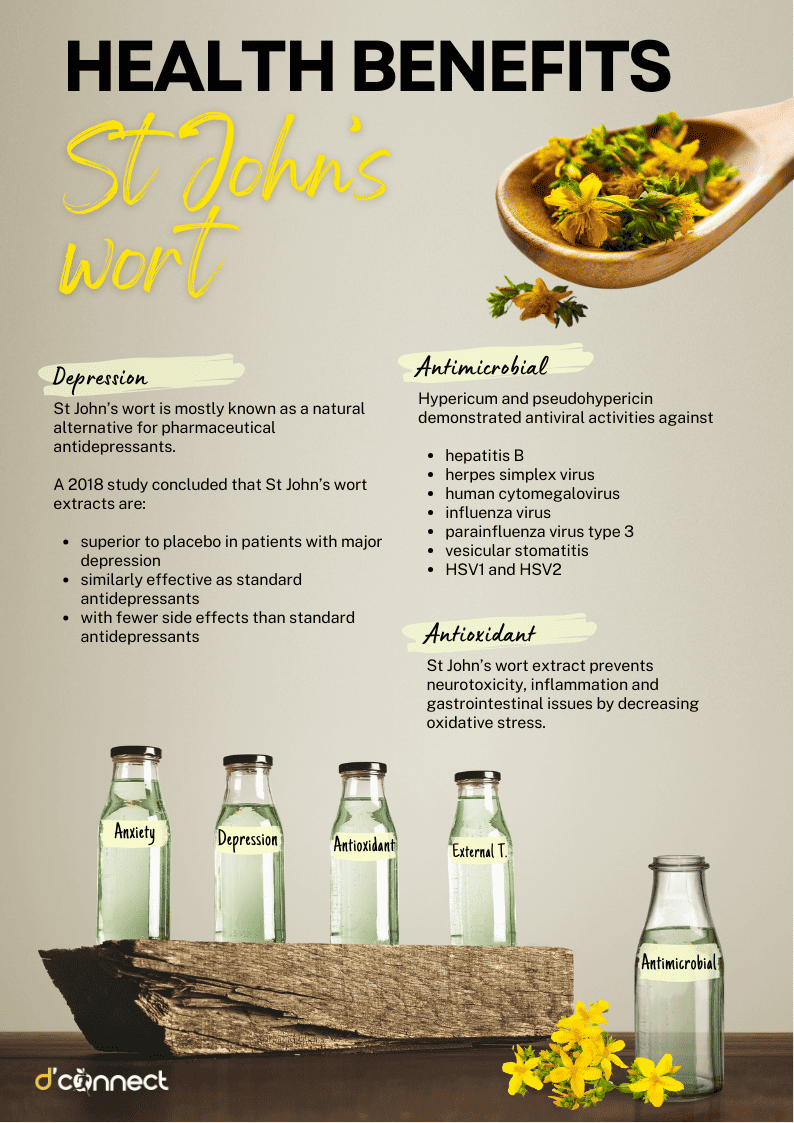
Note — feel free to share or download this illustration.
Related Questions
1. Can I take St John’s wort long term?
St John’s wort is safe to be taken for a longer period for treatment of mild to moderate depression. In general, St John’s wort is safe to be taken for up to 3 months.
2. Who should not take St John’s wort?Anybody who is on any pharmaceutical medications, should avoid taking St John’s wort due to possible herb-drug interactions.
If pregnant and breastfeeding it’s best to avoid St John’s wort due to lack of research and safety data.
3. Can you take St John’s wort alongside antidepressants?
It is recommended not to take St John’s wort alongside antidepressants.
4. Does St John’s wort increase blood pressure?
Generally, St John’s wort does not increase blood pressure. However, interactions with some pharmaceutical medications can result in an increase of the blood pressure.
5. Can I just stop taking St John’s wort, or should I first lower the dosage?
Some people might experience withdrawal symptoms. Therefore, it is recommended to slowly reduce the dosage over several weeks.
If unsure, seek support from the naturopath or a doctor.
Are you currently taking St John’s wort, or are interested in giving it a try? Please let us know in the comments below.
Marijana is a qualified Naturopath, Medical Herbalist, Nutritionist and Neo-Shamanic Energy Healer based in Auckland. Marijana’s life path took her from a career in industrial chemistry and environmental science to natural medicine and energy healing.
Marijana’s mission is to share and inspire how to use the healing power of nature for balancing all four bodies — physical, emotional, mental and spiritual. She believes that identifying and eliminating the underlying cause of the health concern is crucial for achieving optimal wellness.
Her genuine empathy creates a safe space for clients to be open, tell their story and articulate challenges honestly. To assist the natural healing process, Marijana recommends a combination of nutritional and lifestyle modifications, herbal medicine, nutritional supplements and energy healing.
Marijana is passionate about mental health and supporting and educating clients about stress, anxiety, depression management and reduction. She is continuously researching and learning about gut health, the gut-brain axis, and gut connection to other body systems, as well as energy healing and spirituality.
Marijana enjoys supporting people to achieve optimal wellness by balancing body, mind and spirit, allowing them to find again their spark and purpose in this life. You can find Marijana at Change Naturopathy and The Life Centre, and follow her on Instagram, Facebook and YouTube.
References
(1) Fisher, C. (2009). Materia medica of western herbs. Vitex Medica.
(2) Holmes, P. (2006). The energetics of western herbs: A materia medica integrating western & Chinese herbal therapeutics: Vol.2 (Rev. ed.) (4th ed.). Boulder, CO: Snow Lotus Press.
(3) Bone, K., & Mills, S. (2013). Principles and practice of phytotherapy (2nd ed.). Edinburgh, Scotland: Churchill Livingstone Elsevier.
(4) Braun, L., & Cohen, M. (2015). Herbs and natural supplements: An evidence-based guide. (4th ed). Elsevier Health Sciences.
(5) Hoffmann, D. (2003). Medical herbalism: The science and practice of herbal medicine. Rochester, VT: Healing Arts Press.
(6) Barnes, J., Anderson, L. A., & Phillipson, J. D. (2001). St John’s wort (Hypericum perforatum L.): a review of its chemistry, pharmacology and clinical properties. The Journal of pharmacy and pharmacology, 53(5), 583–600. https://doi.org/10.1211/0022357011775910
(7) Bone, K. (2003). A Clinical Guide to Blending Liquid Herbs: Herbal Formulations for the Individual Patient. St. Louis, Missouri: Churchill Livingstone.
(8) Hechtman, L. (2012). Clinical naturopathic medicine (1st ed.). Chatswood, N.S.W: Elsevier Australia.
(9) Bongiorno B.P. & Murray, M.T. (2013). Hypericum perforatum (St. John’s Worth). In J. E. Pizzorno & M. T. Murray, Textbook of natural medicine (4th ed., pp. 833-841). St Louis, MO: Elsevier.
(10) Zvezdanović, J., Petrović, S., Savić, S. et al. (2021). Phenolics and mineral content in St. John’s wort infusions from Serbia origin: An HPLC and ICP-OES study. Chemical Papers. 75, 2807–2817. https://doi.org/10.1007/s11696-021-01521-1
(11) Raison, C. L., Capuron, L., & Miller, A. H. (2006). Cytokines sing the blues: inflammation and the pathogenesis of depression. Trends in immunology, 27(1), 24–31. https://doi.org/10.1016/j.it.2005.11.006
(12) Chopra, K., Kumar, B., & Kuhad, A. (2011). Pathobiological targets of depression. Expert opinion on therapeutic targets, 15(4), 379–400. https://doi.org/10.1517/14728222.2011.553603
(13) Gobbi, M., Valle, F. D., Ciapparelli, C., Diomede, L., Morazzoni, P., Verotta, L., Caccia, S., Cervo, L., & Mennini, T. (1999). Hypericum perforatum L. extract does not inhibit 5-HT transporter in rat brain cortex. Naunyn-Schmiedeberg’s archives of pharmacology, 360(3), 262–269. https://doi.org/10.1007/s002109900073
(14) Singer, A., Wonnemann, M., & Müller, W. E. (1999). Hyperforin, a major antidepressant constituent of St. John’s Wort, inhibits serotonin uptake by elevating free intracellular Na+1. The Journal of pharmacology and experimental therapeutics, 290(3), 1363–1368.
(15) Linde, K., Ramirez, G., Mulrow, C. D., Pauls, A., Weidenhammer, W., & Melchart, D. (1996). St John’s wort for depression-an overview and meta-analysis of randomised clinical trials. BMJ (Clinical research ed.), 313(7052), 253–258. https://doi.org/10.1136/bmj.313.7052.253
(16) Sarris, J., Nierenberg, A. A., Schweitzer, I., Alpert, J. E., Rosenbaum, J. F., Iovieno, N., Covino, J., Fava, M., & Mischoulon, D. (2013). Conditional probability of response or nonresponse of placebo compared with antidepressants or St John’s Wort in major depressive disorder. Journal of clinical psychopharmacology, 33(6), 827–830. https://doi.org/10.1097/JCP.0b013e31829cc3af
(17) Linde, K., Berner, M., Egger, M., & Mulrow, C. (201805). St John’s wort for depression: meta-analysis of randomised controlled trials. The British journal of psychiatry: the journal of mental science, 186, 99–107. https://doi.org/10.1192/bjp.186.2.99
(18) Szegedi, A, Kohnen, R, Dienel, A & Kieser, M (2005). Acute treatment of moderate to severe depression with hypericum extract WS 5570 (St John’s wort): randomised controlled double blind non-inferiority trial versus paroxetine. BMJ, 330(503), doi: https://doi.org/10.1136/bmj.38356.655266.82
(19) Bone, K. (2007). The ultimate herbal compendium (1st ed.). Phytotherapy Press.
(20) Linde, K., Berner, M. M., & Kriston, L. (2008). St John’s wort for major depression. The Cochrane database of systematic reviews, 2008(4), CD000448. https://doi.org/10.1002/14651858.CD000448.pub3
(21) Shelton, R. C., Keller, M. B., Gelenberg, A., Dunner, D. L., Hirschfeld, R., Thase, M. E., Russell, J., Lydiard, R. B., Crits-Cristoph, P., Gallop, R., Todd, L., Hellerstein, D., Goodnick, P., Keitner, G., Stahl, S. M., & Halbreich, U. (2001). Effectiveness of St John’s wort in major depression: a randomized controlled trial. JAMA, 285(15), 1978–1986. https://doi.org/10.1001/jama.285.15.1978
(22) Kobak, K. A., Taylor, L. V., Bystritsky, A., Kohlenberg, C. J., Greist, J. H., Tucker, P., Warner, G., Futterer, R., & Vapnik, T. (2005). St John’s wort versus placebo in obsessive-compulsive disorder: results from a double-blind study. International clinical psychopharmacology, 20(6), 299–304. https://doi.org/10.1097/00004850-200511000-00003
(23) Sarris, J., & Kavanagh, D. J. (2009). Kava and St. John’s Wort: current evidence for use in mood and anxiety disorders. Journal of alternative and complementary medicine (New York, N.Y.), 15(8), 827–836. https://doi.org/10.1089/acm.2009.0066
(24) Taylor, L. H., & Kobak, K. A. (2000). An open-label trial of St. John’s Wort (Hypericum perforatum) in obsessive-compulsive disorder. The Journal of clinical psychiatry, 61(8), 575–578. https://doi.org/10.4088/jcp.v61n0806
(25) Martinez, B., Kasper, S., Ruhrmann, S., & Möller, H. J. (1994). Hypericum in the treatment of seasonal affective disorders. Journal of geriatric psychiatry and neurology, 7 Suppl 1, S29–S33. https://doi.org/10.1177/089198879400700109
(26) Wheatley D. (1999). Hypericum in seasonal affective disorder (SAD). Current medical research and opinion, 15(1), 33–37. https://doi.org/10.1185/03007999909115171
(27) Wölfle, U., Seelinger, G., Schempp, C. (2013). Topical application of St. Johnʼs wort (Hypericum perforatum). Planta Medica, 80(02/03),109-120.
(28) Schempp, C. M., Windeck, T., Hezel, S., & Simon, J. C. (2003). Topical treatment of atopic dermatitis with St. John’s wort cream – a randomized, placebo controlled, double blind half-side comparison. Phytomedicine: international journal of phytotherapy and phytopharmacology, 10 (4), 31–37. https://doi.org/10.1078/1433-187x-00306
(29) Tedeschi, E., Menegazzi, M., Margotto, D., Suzuki, H., Förstermann, U., & Kleinert, H. (2003). Anti-inflammatory actions of St. John’s wort: inhibition of human inducible nitric-oxide synthase expression by down-regulating signal transducer and activator of transcription-1alpha (STAT-1alpha) activation. The Journal of pharmacology and experimental therapeutics, 307(1), 254–261. https://doi.org/10.1124/jpet.103.054460
(30) Medina, M. A., Martínez-Poveda, B., Amores-Sánchez, M. I., & Quesada, A. R. (2006). Hyperforin: more than an antidepressant bioactive compound? Life sciences, 79(2), 105–111. https://doi.org/10.1016/j.lfs.2005.12.027
(31) Mortensen, T., Shen, S., Shen, F., Walsh, M. K., Sims, R. C., & Miller, C. D. (2012). Investigating the effectiveness of St John’s wort herb as an antimicrobial agent against mycobacteria. Phytotherapy research: PTR, 26(9), 1327–1333. https://doi.org/10.1002/ptr.3716
(32) Allegra, A., Tonacci, A., Spagnolo, E. V., Musolino, C., & Gangemi, S. (2020). Antiproliferative Effects of St. John’s Wort, Its Derivatives, and Other Hypericum Species in Hematologic Malignancies. International journal of molecular sciences, 22(1), 146. https://doi.org/10.3390/ijms22010146
(33) Posadzki, P., Watson, L. K., & Ernst, E. (2013). Adverse effects of herbal medicines: an overview of systematic reviews. Clinical medicine (London, England), 13(1), 7–12. https://doi.org/10.7861/clinmedicine.13-1-7
(34) Bernd, A., Simon, S., Ramirez Bosca, A., Kippenberger, S., Diaz Alperi, J., Miquel, J., Villalba Garcia, J. F., Pamies Mira, D., & Kaufmann, R. (1999). Phototoxic effects of Hypericum extract in cultures of human keratinocytes compared with those of psoralen. Photochemistry and photobiology, 69(2), 218–221. https://doi.org/10.1562/0031-8655(1999)069<0218:peoeic>2.3.co;2
(35) Brockmöller, J., Reum, T., Bauer, S., Kerb, R., Hübner, W. D., & Roots, I. (1997). Hypericin and pseudohypericin: pharmacokinetics and effects on photosensitivity in humans. Pharmacopsychiatry, 30 Suppl 2, 94–101. https://doi.org/10.1055/s-2007-979527
(36) Klier, C. M., Schäfer, M. R., Schmid-Siegel, B., Lenz, G., & Mannel, M. (2002). St. John’s wort (Hypericum perforatum) – is it safe during breastfeeding? Pharmacopsychiatry, 35(1), 29–30. https://doi.org/10.1055/s-2002-19832
(37) Moretti, M. E., Maxson, A., Hanna, F., & Koren, G. (2009). Evaluating the safety of St. John’s Wort in human pregnancy. Reproductive toxicology (Elmsford, N.Y.), 28(1), 96–99. https://doi.org/10.1016/j.reprotox.2009.02.003
(38) Borrelli, F., & Izzo, A. A. (2009). Herb-drug interactions with St John’s wort (Hypericum perforatum): an update on clinical observations. The AAPS journal, 11(4), 710–727. https://doi.org/10.1208/s12248-009-9146-8
(39) Izzo A. A. (2004). Drug interactions with St. John’s Wort (Hypericum perforatum): a review of the clinical evidence. International journal of clinical pharmacology and therapeutics, 42(3), 139–148. https://doi.org/10.5414/cpp42139
(40) Nicolussi, S., Drewe, J., Butterweck, V., & Meyer Zu Schwabedissen, H. E. (2020). Clinical relevance of St. John’s wort drug interactions revisited. British journal of pharmacology, 177(6), 1212–1226. https://doi.org/10.1111/bph.14936
(41) Pfrunder, A., Schiesser, M., Gerber, S., Haschke, M., Bitzer, J., & Drewe, J. (2003). Interaction of St John’s wort with low-dose oral contraceptive therapy: a randomized controlled trial. British journal of clinical pharmacology, 56(6), 683–690. https://doi.org/10.1046/j.1365-2125.2003.02005.x
(42) Colalto C. (2010). Herbal interactions on absorption of drugs: Mechanisms of action and clinical risk assessment. Pharmacological research, 62(3), 207–227. https://doi.org/10.1016/j.phrs.2010.04.001
(43) Kober, M., Pohl, K., & Efferth, T. (2008). Molecular mechanisms underlying St. John’s wort drug interactions. Current drug metabolism, 9(10), 1027–1037. https://doi.org/10.2174/138920008786927767
(44) Pilkington, K., Boshnakova, A., & Richardson, J. (2006). St John’s wort for depression: time for a different perspective? Complementary therapies in medicine, 14(4), 268–281. https://doi.org/10.1016/j.ctim.2006.01.003

